Xenoblade Chronicles 2: Torna - The Golden Country (Nintendo Switch) Review
By Renan Fontes  22.12.2018
22.12.2018
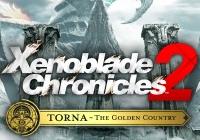
Xenoblade, as a franchise, has been on a bit of a downward trajectory since its inception. The original Xenoblade Chronicles for the Wii was widely considered to be one of the greatest RPGs of its generation; Xenoblade Chronicles X was met with a fair bit of backlash for its story and setting, but the strength of its gameplay and script kept fans in check; and Xenoblade Chronicles 2 seems to have divided the fanbase completely due to its more juvenile approach to storytelling along with overly complex gameplay mechanics. Despite being an extension of XC2, Torna - The Golden Country continues the series' trend of shaking up the foundation, straying away from its source to craft an identity of its own. Perhaps surprisingly, it's far stronger for it.
Although Xenoblade Chronicles 2 is packed with far more content than its follow-up, offering full customization for every party member, along with a host of mechanics to play around with, Torna - The Golden Country manages to come out the far stronger game in large part due to its simpler approach.
In trimming away all the fat, Xenoblade 2's strength can be seen all the clearer, and not just in terms of gameplay. The RPG tells a story that is full of heart and tragedy. The world of Alrest is a finite one, dying with each passing minute. Combat itself is also incredibly engaging even without all the bells and whistles - perhaps even more so.
What specifically bogged down the original XC2 was how overindulgent it was in every facet of its design. The narrative was inherently dark, but the script also wanted to bask in lighter moments frequently, creating a dissonant in regards to the stakes and how characters interacted with their world; gameplay was easy to pick up, but not so much difficult to master as it was difficult to understand; and the overall pacing expected players to consistently go out of their way to tackle as much optional content as possible lest they be overwhelmed with cutscenes.
This isn't to say Torna doesn't fall into the same trappings as its progenitor, as there are still those humorous moments that fail to land, and the pacing itself comes to a halt at the end specifically to force players to trudge through a myriad of side quests, but, on the whole, The Golden Country handles its flaws with a considerable amount of grace.
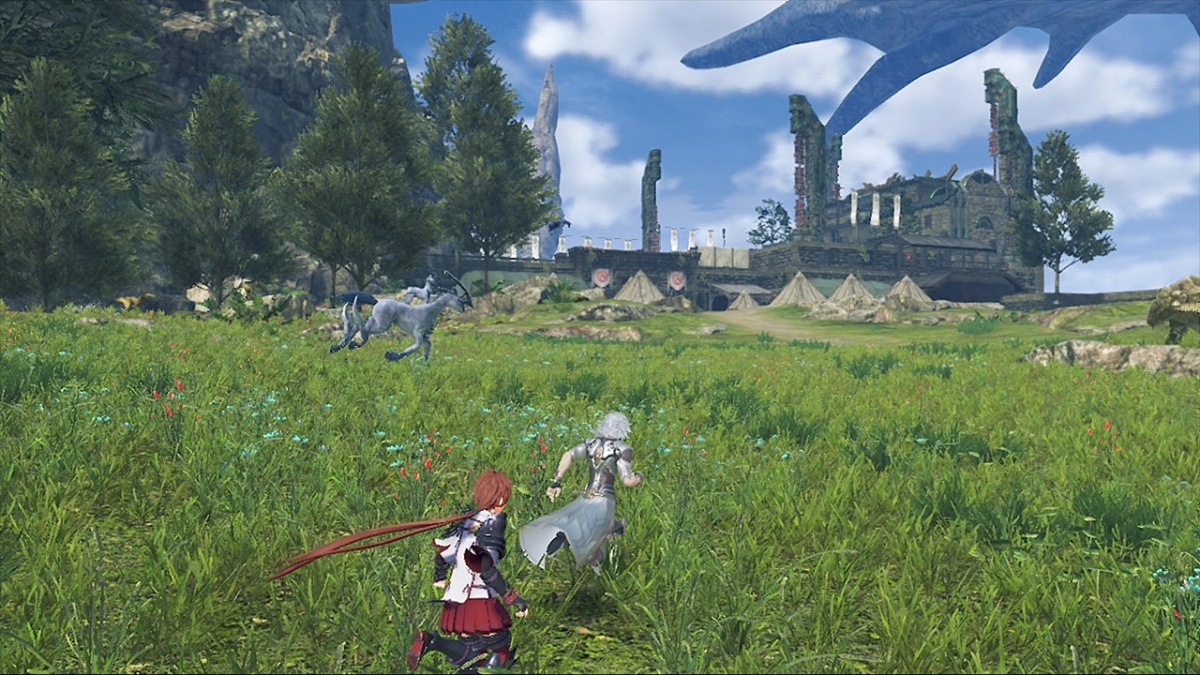
The forced-in humor, while far from perfect, is few and far between. It certainly helps that the story this time around is more overtly centered on darker concepts meaning that the moments of levity at the very least feel appropriately placed. As for the pacing, the mandatory side quests at the end do play a very important role both mathematically and narratively. That doesn't exempt it from criticism, but it does directly make the tragedy of the finale all the more poignant.
It is worth noting that while the DLC's lows aren't nearly as low as the base game's, its highs also don't strike the same chords. There are quite a few genuinely incredible moments narratively, and the script as a whole is far tighter with a more focused tone, but the plot never gets as hectic and blood pumping as XC2's. Of course, when it comes between a consistently good story versus a consistently mediocre one with a few amazing moments, the former is always preferable.
Helping craft a stronger story is a stronger cast altogether. Given how much focus Mythra gets in the original, and just how much the lore stops to focus on Addam, having Addam and Mythra serve as the protagonists seems almost natural, but those titles belong to Lora and Jin, showing their lives before Jin ultimately becomes an antagonist.
It isn't as if Mythra and Addam lack focus - the two effectively share the tritagonist slot - but choosing to frame the story through Lora's eyes was a brilliant move on Monolith Soft's part. It not only allows audiences to connect to Addam on an emotional level, it allows them to look at him objectively, outside the context of his legendary status.
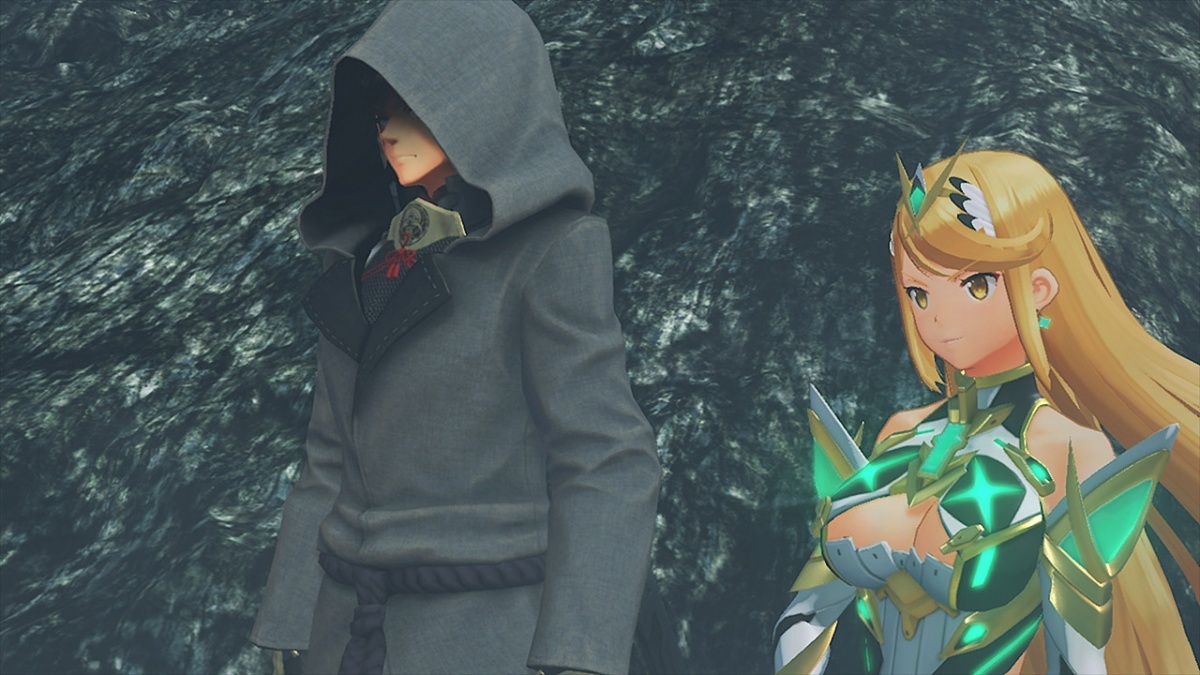
On top of that, it keeps Mythra from playing a role similar to her own in the main game where her and Pyra were the deuteragonists. It also recontextualizes Jin, shedding light on his original personality and recontextualizing the brief moments he laments on Lora's fate in the original story.
Where Xenoblade 2 had a few strong characters in Nia, Morag, and Zeke, every member of Torna's supporting cast has an appropriate amount of depth and charm to them without ever falling to the insufferability of Tora or the sheer pandering of Poppi. Hugo defies the stereotypical boy emperor trope entirely; Brighid and Aegaeon enhance their appearances in the main game; and Minoth and Haze add a fair bit of dramatic irony to their characters while also coming out fully developed characters.
The strength of The Golden Country's script is in how it can develop a large cast to their fullest in a short amount of time while actively making their moments in the original's plot infinitely stronger. Having context for Addam's character helps give weight to Rex's arc that wasn't originally there; Jin is a deeper character now that his relationship with Lora is laid bare; and recognizing familiar faces from Torna in XC2, and vice versa, widens the story's scope for the better.
The gameplay in general has been given a massive, yet recognizable, makeover. Nobody hopping over from the base game will struggle to adapt to the combat as the core mechanics are still the same, but how players tackle each given battle has been changed considerably.
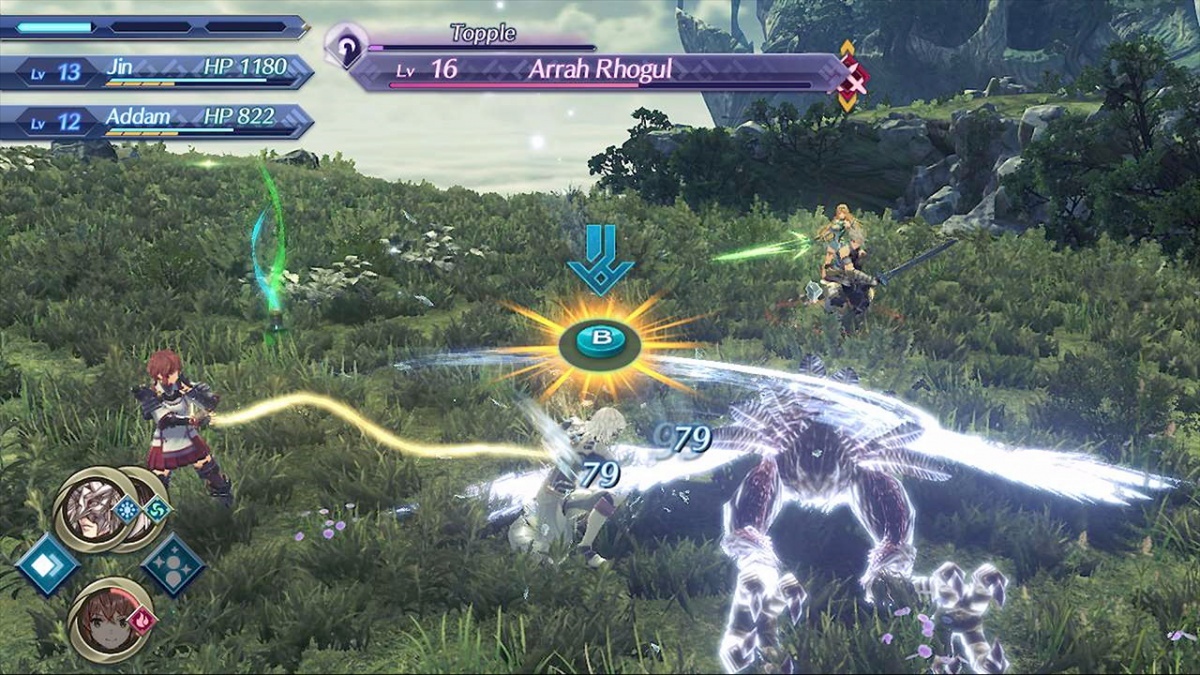
Rather than awakening new Blades via a gacha system, each Driver has their own set of two Blades that cannot be removed over the course of the adventure. Lora will always have Jin and Haze; Addam will always have Mythra and Minoth; and Hugo will always have Brighid and Aegaeon. While this does downplay the customization angle, it lets the action flow with a deliberate smoothness.
Because characters are static, but Blades still offer gameplay differences, playing as any given Driver results in controlling three party members at once, each one with their own unique skills and play styles. Lora fights primarily with her fists, but she can switch control over to Jin during the course of the battle, allowing him to use his katana and ice-based skills to tackle enemies. Once the secondary swap gauge fills up, Jin can then swap to the wind-based Haze who can heal the party.
While Drivers can actually find new weapons to change their elements, Blades will always have their main element intact. It isn't as if there isn't customization at play, but the fixed party approach allows for a degree of growth from start to finish where players will gradually learn not only what best suits their play style, but how best to use them. Lora/Jin/Haze feels like a legitimately cohesive team of one Driver and their two Blades, and the same goes for Addam's and Hugo's teams. It doesn't allow for as much experimentation, but it arguably is a better approach than the main game's, as it's hard to get attached to Blades when better ones are always around the corner.
As a result of the shorter play time, characters progress at a far faster rate, which does help the pacing considerably. Leveling up isn't particularly difficult, Affinity Trees fill up quick with less tedious requirements, and there's more than enough SP to go around. Characters even have rear guard arts this time around, which allows them to attack even when they aren't being actively controlled.
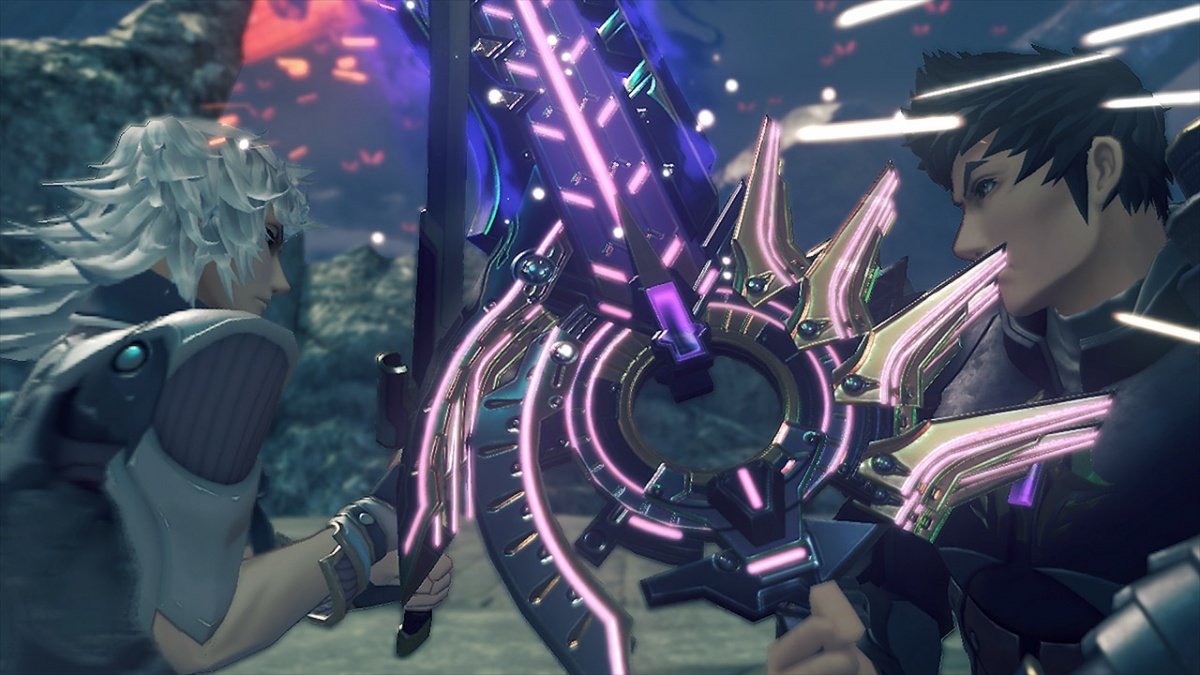
A set of fixed Blades also means that field skills are no real problem. In Xenoblade Chronicles 2, plenty of goodies, and even story, would be locked behind field skills, potentially requiring grinding or even awakening a new Blade with an affinity for the desired skill. This time around, all the Blades are set, which means it's impossible not to have a field skill prepared at any given moment.
Titan exploration still plays a large role, as well, with a host of side quests, unique enemies, and secret areas to uncover. There are only two Titans this time around - the titular Torna and Gormott - but there's enough justification for a smaller-scoped Alrest.
Narratively, The Golden Country is about the final days of Torna and the events leading up to the start of the main game. Lora's adventure is not the same as Rex's, and the plot requires an understanding of why exactly Addam and Torna have such a lasting legacy. Allowing the party to travel to Gormott gives a glimpse at a familiar location in a younger time, but straying too often from Torna would result in a weaker story that could potentially fail to do justice to Addam, Torna as a conceptual nation, and Lora's role in Jin's arc.
Ideally, Torna - The Golden Country should have been longer with a bit less emphasis on side content at the very end of the experience, but it still winds up a stronger game than Xenoblade Chronicles 2. Torna is that rare piece of DLC that enhances its source game in every sense. The Golden Country isn't just better; Xenoblade Chronicles 2 is a better game because it exists.
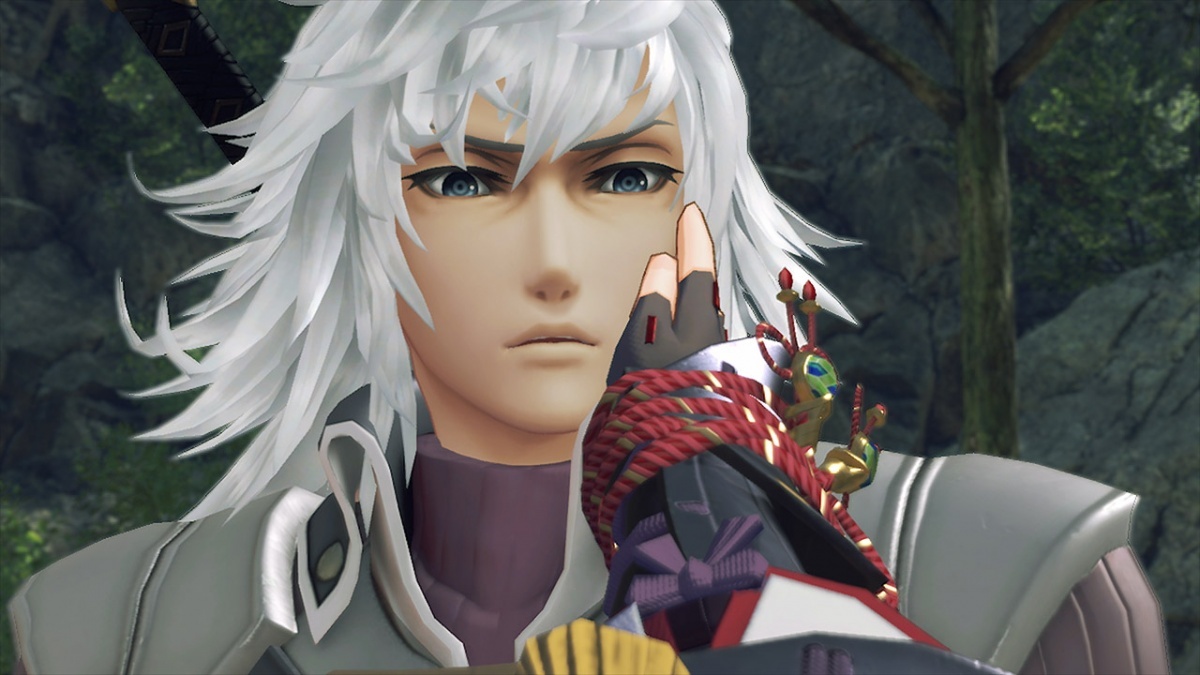
Cubed3 Rating
Great - Silver Award

With refined combat, a far tighter script, and an infinitely more likable cast, Torna - The Golden Country manages to address almost all of Xenoblade Chronicles 2's core problems without ever straying too far from its source. The DLC does still suffer from a few of XC2's flaws, particularly in how it paces its story and handles tone, but Torna is nonetheless a fantastic prequel that helps to fill in the blanks without ever feeling pandering or relying too much on fan service. This expansion is a net positive for the series, showing that Monolith Soft is willing to address criticism in earnest. In many respects, Torna - The Golden Country is the game Xenoblade Chronicles 2 should have been.
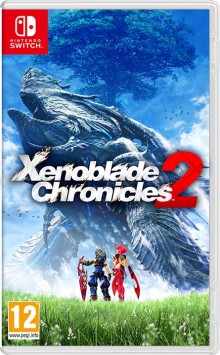
![]() 7/10
7/10
![]() 7/10
(1 Votes)
7/10
(1 Votes)
 Out now
Out now  Out now
Out now  Out now
Out now  Out now
Out now Comments
Comments are currently disabled

 Sign In
Sign In Game Details
Game Details Subscribe to this topic
Subscribe to this topic Features
Features





 Top
Top

